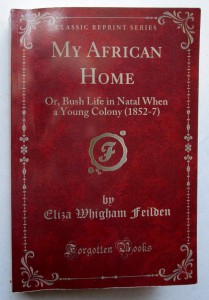“Leyland and I walked over on Christmas morning to our old neighbor Mrs. Bowen, that she might not feel quite alone in the world….”
With these words Eliza Whigham Feilden, a 19th-century English memoirist, introduces a significant character in her book, My African Home – Or, Bush Life in Natal When a Young Colony (1852-7), first published in London in 1887.
I’m reading this book, which is one of the roughly 800,000 books available from the Forgotten Books series (www.ForgottenBooks.com), as part of my research for my next book, a novel based on the life of my great-grandmother, Helen Reid David Black, who emigrated from Scotland to Natal, South Africa, in the 1880s.
I’ve written the bones of Helen’s story – from what little I know and what I’ve been able to imagine – but I know I need more flesh and blood. What was the climate like there and then? What flowers grew and what was their fragrance like? What wild animals threatened the garden and the chickens? How were the settlers’ relations with the local Zulus? Eliza Feilden is providing detailed answers to my many questions from her honest, down-to-earth, first-hand account of life there in the mid-19th century.
Unexpectedly, though, Feilden has also given me inspiration in the form of her 76-year-old neighbor, Milesina Bowen. I find myself dog-earing the pages where Mrs. Bowen appears and rereading the sections where the young Eliza, newly arrived in Natal from England with her husband Leyland, describes her “old neighbor”:
“I wish I could convey to my readers a more vivid picture of my dearly valued and loved old friend. Imagine a small, slender, antiquated, stooping figure, a quick and piercing eye … a look of mind and graceful dignity, combined with gentle but determined resolution, that even strong men were afraid of her….”
“[H]er letters and conversation are a strange mixture of wit, satire, sarcasm, humility, love, and hate. I have never met with so interesting and singular a character, and with it all, so delicate, refined, and generous a mind. She welcomes you into her little hut with the grace and dignity of a duchess; spreads the table-cloth, brings out wine and cake or bread, as it may be, with a little fresh butter, and gently asks you to partake….”
“She is peculiar – the fact of her living alone in the wilderness proves that – she fears being ruled if she should send for a relative…. Her mind is wonderful. Her memory, reasoning powers, every faculty perfect as in a young person, with a good touch of romance to gild all she says and hears, and a rich store of book knowledge and history, so that an hour’s chat with her is a treat in the wilderness of Africa, and we grow daily greater friends.
“She told me of the loss of her three sons and her husband, one in each of the four quarters of the globe, and she took her garden key and her stick, wearing her last son’s straw hat, to show me the tree under which he is buried, and to ask me to come some day and make her a sketch of it. She considers I am sent by God to be her friend, adding that wherever she has wandered she has found one who can feel like herself, and who has the same eternal interests at heart.”
Feilden also describes her friend Mrs. Bowen as “an elegant poetess,” and she shares several of her poems. Here is one:
Forget me not! Forget me not!
Though summer friends are smiling –
Though various cares should be thy lot,
Or pleasure’s snares beguiling.
I will not deem our hearts estranged
Because so rare our meetings,
While welcome words of love unchanged
Foreshadow future greetings.
There needs not always years to bind
Sweet ties, — to friendship dearest
A glance reveals the kindred mind,
To hope’s strong vision, clearest.
Emblem of life, dear lady, view
The rising and the setting sun!
Oh, may bright beams still rest on you
Yet, when my weary race is run,
Forget me not! Forget me not!
— Milesina Bowen, August, 1853
Eliza Feilden kept her promise to her “old neighbor” Mrs. Bowen by immortalizing her in her memoir, My African Home – which has (alas) become a “forgotten book.” I now feel the need to help keep Milesina Bowen’s memory alive in this post. Imagine her — a real, not fictitious, 76-year-old woman — small, seemingly insignificant, yet strong, stubborn, and independent, living there and then, and be, like me, inspired.

